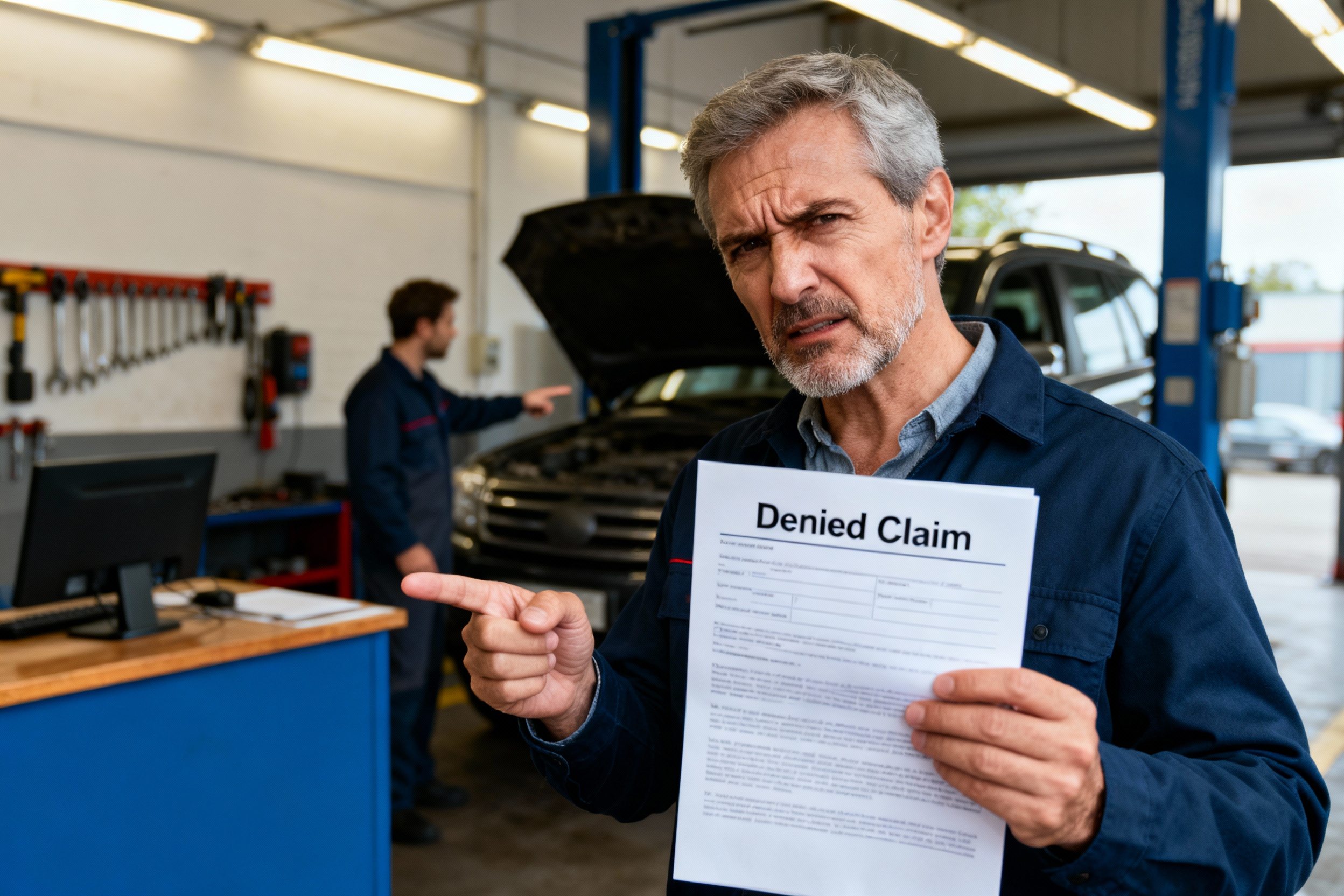Vehicle Service Contract Complaints: Top 3 Problems & How to Avoid Them
Quick Answer: The most common vehicle service contract complaints are coverage denials ("my part wasn't covered"), hidden fees and unexpected costs, and poor customer service with claim delays. Most vehicle service contract complaints stem from buying inadequate coverage levels rather than provider dishonesty. The solution is exclusionary coverage with transparent pricing and simple claim processes—eliminating the root causes of complaints.
Vehicle service contract complaints fill consumer forums, BBB reports, and review sites across the internet. Frustrated customers describe claim denials, surprise fees, and weeks-long approval processes that leave them stranded without transportation. While some complaints target legitimately bad providers, most vehicle service contract complaints reveal a deeper industry problem: complexity and confusing coverage tiers create misaligned expectations between what customers think they bought and what actually protects them.
Understanding the most common vehicle service contract complaints helps you avoid these frustrations entirely. The patterns are clear—certain problems appear repeatedly across thousands of complaints, and they share common root causes that modern warranty structures have eliminated.
The Most Common Vehicle Service Contract Complaints
Analysis of vehicle service contract complaints from the Better Business Bureau and Ripoff Report reveals three dominant categories that account for most customer frustration. These aren't random issues—they represent systematic problems with how traditional warranties are structured, sold, and serviced.
Vehicle Service Contract Complaints by Category
- Coverage Denials ("Part Not Covered"): 47% of complaints
- Poor Customer Service & Delays: 28% of complaints
- Hidden Fees & Unexpected Costs: 25% of complaints
What's notable about these vehicle service contract complaints isn't that providers are universally dishonest—most aren't. The issue is that warranty structures with 5-6 confusing coverage tiers, dealer sales pressure to buy cheaper (inadequate) plans, and complex multi-layered administrative systems create problems that leave customers feeling cheated even when companies technically follow contract terms.
Complaint #1: “The Part That Broke Isn’t Covered”
This vehicle service contract complaint dominates consumer forums and review sites. Customers describe needing transmission work, engine repairs, or electrical system fixes only to learn their specific problem falls outside their coverage. The breakdown conversation typically sounds like: "I have an extended warranty, why isn't this covered?"
The answer almost always traces back to coverage tier confusion. Modern vehicles contain over 20,000 individual parts. Most warranty shoppers don't understand the dramatic difference between basic stated-component plans (covering 50-100 specific parts), mid-tier named-component coverage (500-1,000 parts), and comprehensive exclusionary plans (everything except a short list of exclusions).
The Coverage Tier Trap
Here's how this vehicle service contract complaint develops:
- At purchase: Dealer explains "this plan covers a lot" (technically true—50 parts is "a lot")
- Sales pressure: Customer encouraged toward cheaper tier to fit budget
- Customer assumes: "Extended warranty" means comprehensive protection
- Six months later: Breakdown occurs, customer learns part isn't covered
- Result: Customer feels deceived, leaves angry review
| Coverage Level | Components Protected | Typical Cost Difference | Risk Level |
|---|---|---|---|
| Basic/Powertrain Only | 50-100 parts (engine, transmission internals only) | Cheapest | High - Most repairs excluded |
| Mid-Tier/Named Component | 500-1,000 specific parts listed in contract | Moderate | Medium - Many gaps remain |
| Comprehensive/Exclusionary | 18,000+ parts (everything except short exclusions list) | Higher upfront, better value | Low - Few coverage gaps |
This coverage tier confusion generates most vehicle service contract complaints about denials. When customers don't understand what they bought—or forget after months pass—legitimate claim denials feel like scams.

How VIP Eliminates the Coverage Complaint
The solution to this primary vehicle service contract complaint isn't better sales training—it's eliminating the confusion entirely. VIP Warranty uses exclusionary coverage exclusively, meaning there's one plan, not five confusing tiers. Everything mechanical is covered except for a short, readable list of maintenance items and wear components.
| Coverage Approach | Traditional Warranties | VIP Warranty |
|---|---|---|
| Coverage Options | 5-6 confusing tiers to choose from | One exclusionary plan |
| Sales Process | Pressure to downgrade to cheaper plans | No sales calls, no pressure |
| What's Covered | Listed components only (hundreds of pages) | Everything except short exclusions list |
| Customer Knowledge | Forgets coverage details after purchase | Simple: nearly everything is covered |
| Claim Denials | Frequent for tier-related reasons | Rare - true mechanical failures covered |
Customers can't be confused about what's covered when the answer is "almost everything mechanical." This single change eliminates the most common vehicle service contract complaint entirely.
Complaint #2: Hidden Fees & Unexpected Costs
The second most frequent vehicle service contract complaint involves costs customers didn't anticipate: per-repair deductibles that never end, inspection fees before coverage activates, diagnostic teardown charges, and various administrative fees buried in contracts. These surprises create justified anger—customers paid for protection but face bills anyway.
Per-repair deductibles deserve special attention in vehicle service contract complaints. Traditional providers charge $100-250 every single time you use the warranty, forever. Three repairs over two years equals $300-750 in deductibles beyond your coverage cost. Customers forget about perpetual deductibles until the repair shop quote arrives.
| Fee Type | Traditional Warranties | VIP Warranty |
|---|---|---|
| Vehicle Inspection Required | $100 - $200 (before coverage starts) | $0 (no inspection needed) |
| Per-Repair Deductible | $100 - $250 (every single repair) | $300 for 6 months, then $0 forever |
| Diagnostic Teardown | You pay first ($200-600) | Covered when necessary |
| Rate Increases | Unpredictable or coverage dropped | Maximum 5% annually, rate locked |
| Cancellation Penalty | $50 - $250 fee | $0 (cancel anytime) |
One particularly frustrating vehicle service contract complaint involves authorized teardowns. Traditional providers often require you to pay $200-600 for diagnostic teardown before they'll approve coverage—then deny the claim, leaving you with the teardown bill and an uncovered repair.
The Dealer Markup Reality
Why do traditional vehicle service contract complaints so frequently mention hidden fees? The answer lies in warranty distribution structure. When you buy through a dealer, multiple businesses take cuts: the dealership marks up 200-400%, the wholesale provider takes their margin, and the administrator charges processing fees. Each layer needs revenue, creating the fees that generate complaints.
VIP Warranty eliminates middlemen by functioning as the actual insurance company providing coverage. No dealer, no wholesale provider, no administrator—just direct-to-consumer warranty protection. This structural simplicity enables transparent pricing without surprising fees.

Complaint #3: Poor Customer Service & Claim Delays
The third major category of vehicle service contract complaints focuses on administrative frustration: impossibly long hold times, unclear communication about claim requirements, weeks waiting for repair approval, and representatives who can't answer basic questions. When your car is broken and you need it for work, these delays feel like bad faith even when they're just administrative incompetence.
Many vehicle service contract complaints describe this timeline: breakdown occurs, customer files claim, provider requests additional documentation, customer submits paperwork, provider requires authorized teardown at customer expense, customer pays for teardown, weeks pass, approval finally arrives (or claim is denied), rental car coverage has long expired, customer is furious.
| Service Factor | Traditional Warranties | VIP Warranty |
|---|---|---|
| Initial Response Time | Days to weeks | Same business day |
| Claim Process Clarity | Confusing, unclear requirements | Transparent, straightforward |
| Approval Speed | 1-3 weeks typical | 24-48 hours for most claims |
| Forced Teardown | Often required at your cost first | Rare, covered when necessary |
| Rental Car During Delays | Expires before approval | Properly covered through repair |
These vehicle service contract complaints often reflect structural complexity rather than intentional delays. Traditional providers layer multiple administrators, adjusters, and approval departments between you and coverage decisions. Each handoff creates delay. Simple structures enable fast decisions.
Why These Vehicle Service Contract Complaints Exist
Understanding vehicle service contract complaints requires looking beyond individual bad actors to systemic industry problems. While some providers are genuinely dishonest, most complaints stem from complexity rather than malice:
- Too many coverage tiers: 5-6 confusing options create genuine misunderstanding about what's protected
- Multi-layered distribution: Dealer → wholesale provider → administrator → insurance company creates communication breakdowns
- Sales pressure: Dealers earn more selling cheaper (inadequate) coverage, incentivizing downgrades
- Financing structures: Complex loan arrangements hide true costs and reduce transparency
- Fine print culture: Hundreds of pages of terms create contracts nobody reads or understands
The solution isn't better enforcement of existing structures—it's eliminating the complexity that generates vehicle service contract complaints in the first place. Simple coverage (exclusionary), transparent pricing (monthly subscription), and direct service (no middlemen) address root causes rather than symptoms.
Additional Resources: Vehicle Service Contract Complaints
Research Vehicle Service Contract Providers & Complaints
- Better Business Bureau (BBB) - Extended warranty company ratings and complaint histories
- Ripoff Report - Consumer complaint database for warranty providers
- Consumer Reports - Extended warranty buying guide and provider reviews
- Federal Trade Commission (FTC) - Consumer guide to vehicle service contracts
- NHTSA - Vehicle reliability, safety ratings, and recall information
- RepairPal - Repair cost estimates and certified shop reviews
FAQ: Vehicle Service Contract Complaints
The most common vehicle service contract complaint is "the part that broke isn't covered." This accounts for approximately 47% of complaints and usually stems from customers purchasing basic stated-component coverage when they thought they were buying comprehensive protection. With over 20,000 parts in modern vehicles, stated-component plans that cover only 50-100 specific parts leave massive coverage gaps that surprise customers when breakdowns occur.
Most claim denials aren't fraud—they're coverage tier mismatches. Customers often buy basic or mid-tier plans to save money, then assume "extended warranty" means comprehensive coverage. When repairs involve parts not explicitly listed in stated-component contracts, claims are legitimately denied per contract terms. The real problem is confusing tier structures and sales pressure toward inadequate coverage. Exclusionary warranties eliminate this issue by covering everything except a short exclusions list.
Many vehicle service contract complaints are justified—customers feel deceived because they genuinely didn't understand what they purchased. However, the frustration often comes from industry complexity rather than outright fraud. Five or six confusing coverage tiers, hundreds of pages of fine print, and multi-layered distribution structures create legitimate misunderstandings. Some providers are dishonest, but most complaints reflect systemic problems with how warranties are structured and sold.
Avoid hidden fees by choosing providers with transparent pricing structures. Ask specific questions before buying: What's the per-repair deductible and does it ever drop? Are there inspection fees? What about diagnostic teardown costs? Cancellation penalties? Transfer fees? Get answers in writing. Subscription-based warranties like VIP eliminate most hidden fees through simple pricing: one setup fee, monthly payments, and deductibles that drop to $0 after six months—no surprises.
If you believe a claim was denied unfairly, first review your contract carefully to confirm coverage. Request written denial explanation citing specific contract language. If denial violates contract terms, escalate through the provider's appeals process. Document everything. File complaints with your state's insurance commissioner and the Better Business Bureau. Consider consulting a consumer protection attorney if the amount is substantial. However, many "unfair" denials are actually tier-related—you may have purchased coverage that doesn't include the failed component.
Monthly subscription warranties tend to generate fewer vehicle service contract complaints because their structure eliminates common frustration sources. No complex financing means no interest charges or refund disputes. Cancel-anytime flexibility removes the trapped feeling. Transparent monthly pricing eliminates hidden fee surprises. Most importantly, subscription providers often use exclusionary coverage exclusively—one simple plan instead of confusing tiers—which prevents the most common complaint: "my part isn't covered."
Research warranty companies through Better Business Bureau ratings, state insurance commissioner complaint records, and independent review sites. Look for providers backed by A-rated insurance companies, not just administrators. Check how long they've been in business—longevity indicates financial stability. Read actual customer reviews focusing on claim experiences, not just pricing. Ask specific questions about claim approval rates and average processing time. Trustworthy companies answer directly and provide references. Avoid high-pressure sales tactics and providers unwilling to explain coverage clearly.
Avoid Vehicle Service Contract Complaints With VIP
The patterns across thousands of vehicle service contract complaints reveal clear root causes: confusing coverage tiers create mismatched expectations, multi-layered distribution structures add hidden fees, and complex administrative systems cause claim delays. These aren't problems individual bad actors create—they're systematic issues built into traditional warranty structures.
VIP Warranty eliminates these complaint sources through structural simplicity:
- One exclusionary plan: No coverage confusion, no tier selection, everything mechanical is protected
- Direct pricing: No dealer markup, no wholesale provider, no hidden middleman fees
- Fast claims: Simple structure enables quick decisions without multi-layer approval chains
- True flexibility: Cancel anytime, no penalties, no refund disputes
Most vehicle service contract complaints are preventable through transparent coverage, clear pricing, and responsive service. When the warranty structure itself eliminates confusion, hidden costs, and administrative complexity, the complaints that dominate consumer forums simply don't occur.
Choose protection built to avoid the problems that generate thousands of complaints across traditional warranty providers. Simple exclusionary coverage, transparent monthly pricing, and direct service mean you'll never wonder if your part is covered, discover surprise fees, or wait weeks for claim approval.

